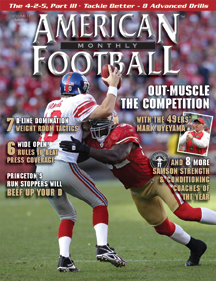Article CategoriesAFM Magazine
|
Taking Your Physical Abilities to the Next Level© More from this issueToday’s players are bigger, stronger, and faster than ever before. A focused conditioning program has become essential to on-the-field success. In Complete Conditioning for Football, a book and combined DVD package, authors Pat Ivey and Josh Stoner detail a comprehensive training program that builds players’ abilities as well as the football-specific skills their positions require. Coach’s Responsibilities Your job as a coach is to help athletes develop and reach their potential. You are measured by results, and your effort determines this. Motivate play....The full article can only be seen by subscribers.
|
|
|||||||
| HOME |
MAGAZINE |
SUBSCRIBE | ONLINE COLUMNISTS | COACHING VIDEOS |
Copyright 2025, AmericanFootballMonthly.com
All Rights Reserved





